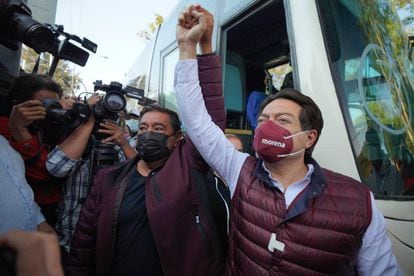Félix Salgado Macedonio and Mario Delgado (right) protest outside the Electoral Tribunal in Mexico City, this Wednesday.
There is little doubt about the austerity of President Andrés Manuel López Obrador or his crusade for a moral renewal of society.
This Wednesday, during his morning press conference, he said it categorically: more important than the laws (against corruption) is to modify the values of society, only that can change injustice and violence.
Hence also his insistence on a moral primer or his obsessive criticism of the crisis of values that in his opinion unleashed the neoliberal model.
Only by reversing these values to return to pristine solidarity and honesty can we build a different country.
The problem for these convictions is reality.
In the quest to build a new society, the need for an ethical revolution competes with a more immediate and pedestrian urgency: to secure the political resources to be in a position to guarantee a change of regime.
In pure silver this means expanding political power.
And both needs rarely result in a good pairing.
The so-called "real politik" is often at odds with dignity or honor.
As has happened to so many moral crusades in history, the 4T is finding that the sacred pursuit of these ends forces us to take measures that, in practice, end up compromising or sacrificing such expensive ideals.
The elections next summer and the electoral campaigns to which it has given rise fully exemplify this contradiction.
López Obrador understands that his movement (Morena and allied parties) must win a qualified majority in the chambers in order to make substantive changes to the Constitution.
It is also obliged to obtain a majority in 17 states to validate such changes.
Only in this way can it guarantee the legal and institutional construction capable of consolidating the long-awaited new regime.
But to do so he knows that he must win at all costs;
and it is precisely there where the pig twists its tail, to put it in the colloquial terms that the president likes.
Both in the selection of candidates and in their internal life processes, Morena has not behaved very differently from the other political parties, so often accused of their immoral practices.
While it is true that, under pressure from the president, he agreed to return a percentage of the high prerogatives that the parties have received, it has been the political institute with the most scandals in the last year.
Their internal elections became a display of mutual claims of illegality, abuse and bad practices.
Regarding the construction of a republic based on values, at least as regards its internal processes, Morena does not seem to have taken a leap forward but back.
And on the issue of candidate selection, it may not have been the worst of the parties, because some of its allies surpassed it, but the election does not seem to have had anything to do with ethics and with the chances of victory at any cost.
Far from making a proposal based on the promotion of the new man or the new woman, in accordance with the humanist discourse of its leader, it has opted for those that offer it some immediate income.
Nothing different from what the PRI, the PAN or the PRD does, but perhaps with an additional aggravation: in the other parties the definition derives from a conspicuous and open finger on the part of the leaders, even when an institutional figure is used ( council or central committee).
In Morena, on the other hand, something is used that many fear is a mere simulation: the application of an opinion poll among the bases to choose the one that “the people” prefer.
The problem is that the data of who enters such surveys, what is their methodology or the breakdown of their results constitute the best kept secret.
As a result of all this, the lists of candidates presented by Morena these days have left a wave of protests among their own ranks and throughout the territory.
Militants displaced by members of the show business for the simple fact of being recognized on social networks, former PRI converts for the occasion but with some clientele base that wants to take advantage of the party, political coyotes with dark backgrounds but effective when mobilizing the vote.
Again, it is not the only party that is doing it.
Perhaps in Morena the protests are more vehement because their candidacies are more coveted than those of their competitors, since the party remains at the forefront, and by a wide margin, in voting forecasts.
Nobody throws a tantrum over the dubious privilege of running a campaign with little chance of winning.
I insist, Morena's behavior is not different from what the PRI or PAN had used to us, but it is true that we would have expected a different behavior from a political movement whose leader maintains that the only legitimate revolution is a revolution of values.
In practice, no one made the PRI candidates a condition that they be honest (only that they govern efficiently and not abuse their slices);
to those of the PAN long ago we stopped pretending that they could be different.
Morena is going to gain positions under the old motto that the means justify the ends, the maxim that has buried the most convictions in the history of man.
The case reminds me of Felipe Calderón, a president very different from AMLO, because indeed he is, even though they are both lifelong political animals.
In a journalistic interview carried out in Los Pinos in the middle of his six-year term, I asked him why, after his arrival in power, for which he had fought for so many years, he was not taking advantage of the opportunity to expand the democratization of the country and dismantle the harmful presidentialism that so much had criticized.
I had met Calderón 15 years before and, although I never coincided with his flags, it seemed to me that his obsession with fighting the PRI and deepening democracy were legitimate.
His answer is a marvel of political practicality, even if it is not very edifying: "to be able to make democratic changes, I first have to strengthen the presidency."
That is, to concentrate more power, although to do so it goes in the opposite direction to its ideals.
One sacrificed his democratic convictions, another postponed his moral prescriptions.
We already know the final result of the first.
The second still has the opportunity to try to get his followers and himself to put his ideals into practice.
@jorgezepedap
Subscribe here
to the
newsletter
of EL PAÍS México and receive all the informative keys of the current situation of this country









